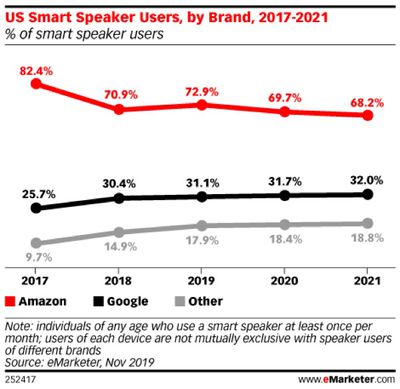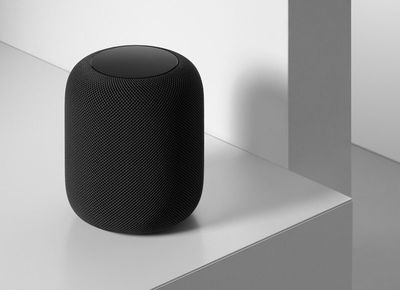Amazon's Echo speakers continue to be the most popular smart speakers in the United States, and will remain in the dominant spot through at least 2021, according to new smart speaker user estimates shared today by eMarketer (via TechCrunch).
An estimated 69.7 percent of U.S. smart speaker users will use an Amazon Echo product in 2020, a number that's down slightly from the estimated 72.9 percent of smart speaker owners who used an Echo in 2019. In 2021, Amazon is estimated to see another small drop in usage, with eMarketer suggesting 68.2 percent of smart speaker owners will use an Echo.

Google is expected to make some headway against Amazon, but eMarketer does not believe that the "Other" category, which includes Apple's HomePod, the Sonos One, and other smart speakers, will gain significant ground over the next two years.
An estimated 31.7 percent of smart speaker owners will use a Google device in 2020, while 18.4 percent will use speakers in the Other category. In 2021, that number is expected to grow to 32 percent for Google and 18.8 percent for the Other category.
Since Amazon first introduced the Echo, it has built a convincing lead in the U.S. and continues to beat back challenges from top competitors," said Victoria Petrock, a principal analyst at eMarketer. "We had previously expected Google and Apple to make more inroads in this market, but Amazon has remained aggressive. By offering affordable devices and building out the number of Alexa skills, the company has maintained Echo's appeal," she added.
eMarketer expects the number of U.S. smart speaker owners to grow over the next several years, but ownership numbers will rise slowly. 28.9 percent of internet users also have a smart speaker, a number that will grow to 30.5 percent next year.
Though Apple's HomePod recently turned two, Apple has had some difficulty securing a foothold in the smart speaker market. Apple's HomePod was priced at $349 when it launched in February 2018, but Apple dropped the price to $299 in April 2019. Even at $299, the HomePod is significantly more expensive than Amazon's Echo lineup, which includes smart speakers at multiple price points. Amazon's lowest priced device, the Echo Dot, sells for $30 and sometimes dips even lower.

Apple was hoping that the superior sound of the HomePod would draw customers to pay extra for sound quality, but the more affordable prices of the Amazon Echo and Google Home have been more appealing to most consumers. Amazon doesn't have quite the same advantage in non-U.S. markets because it supports fewer non-English languages than other speakers like the Google Home, so that is an area where Apple could make inroads into the smart speaker market.
HomePod rollout has been slow, though, with the device limited to the United States, United Kingdom, Australia, Canada, France, Germany, Spain, Mexico, China, Hong Kong, Japan, and Taiwan
Apple is rumored to be working on a new, more affordable version of the HomePod with reduced tweeters, which could be released at some point in 2020. A lower price point will help the HomePod better compete with the Amazon Echo and the Google Home, but it will likely be difficult for Apple to catch up given the lead Amazon and Google have in the smart speaker market.























